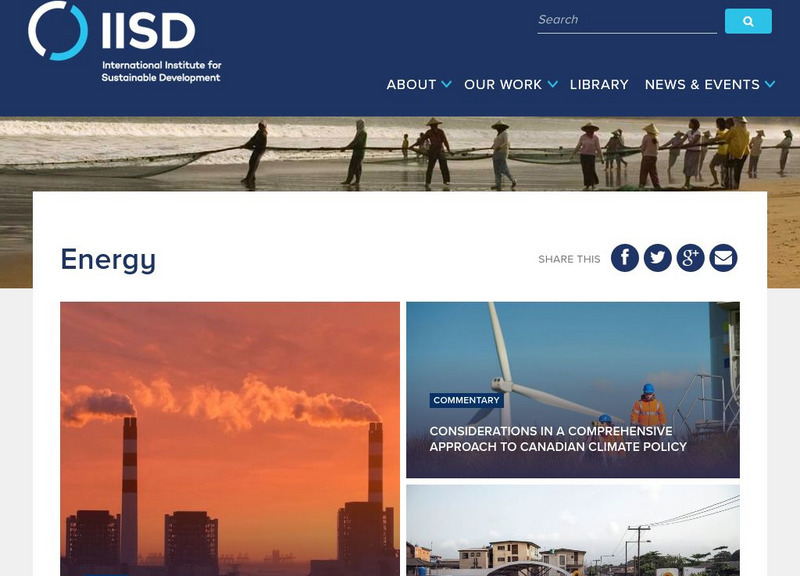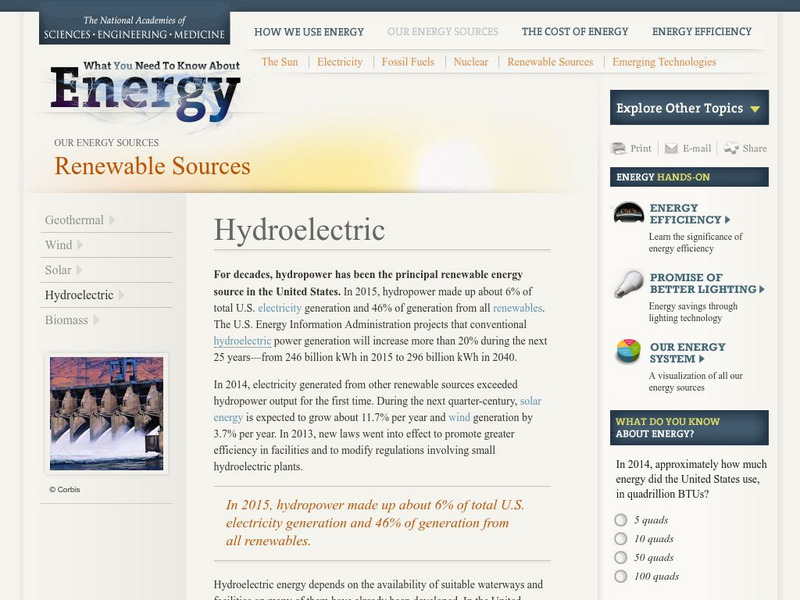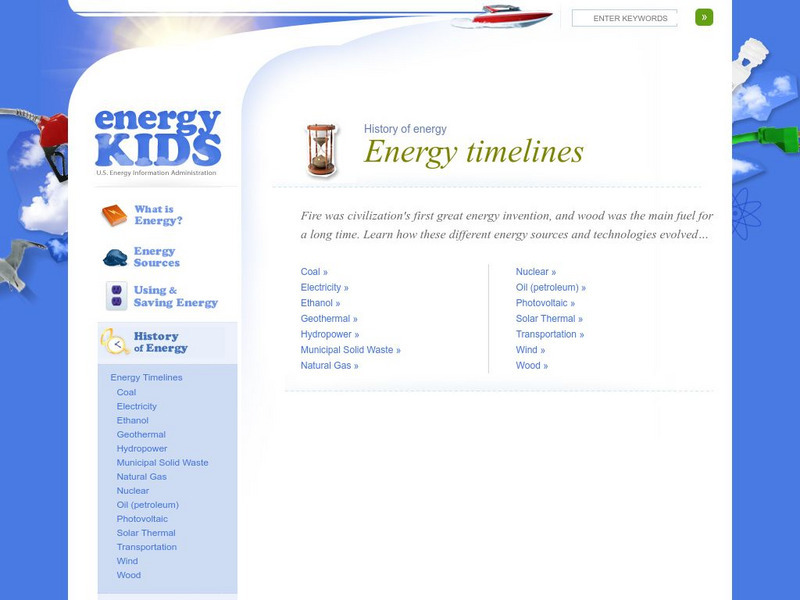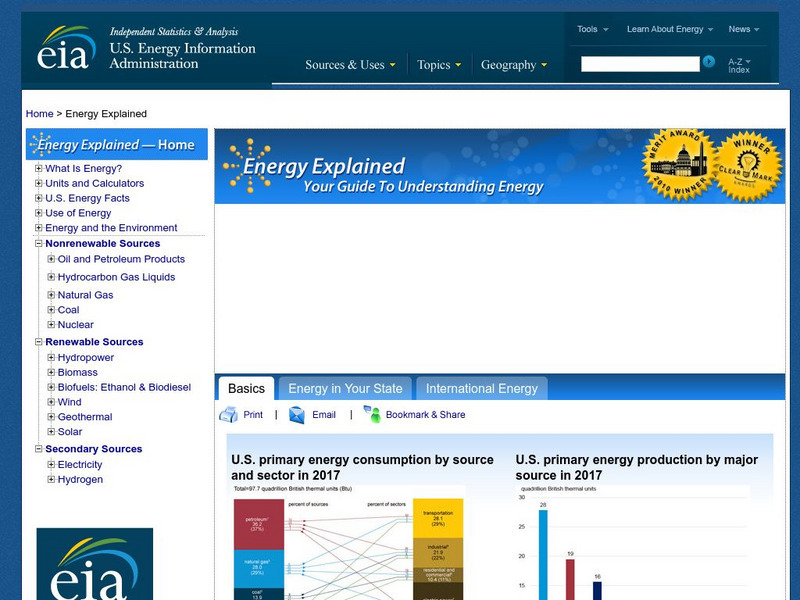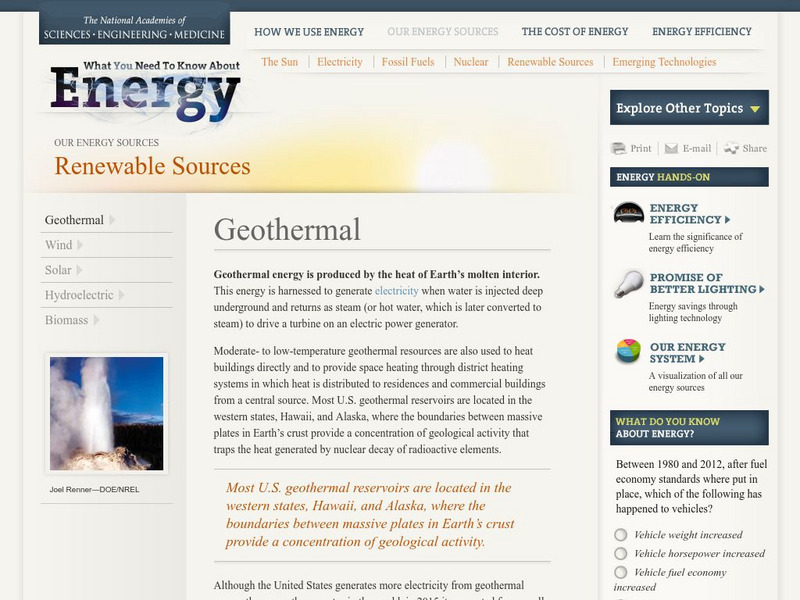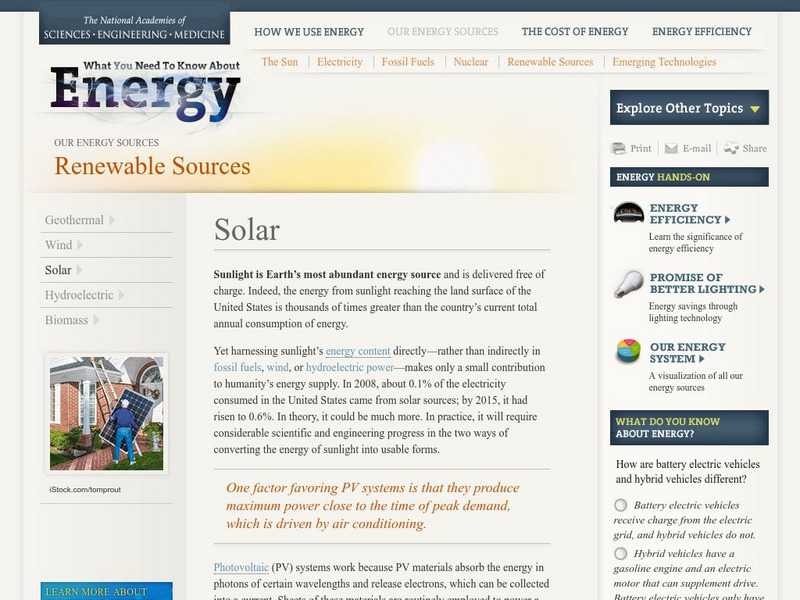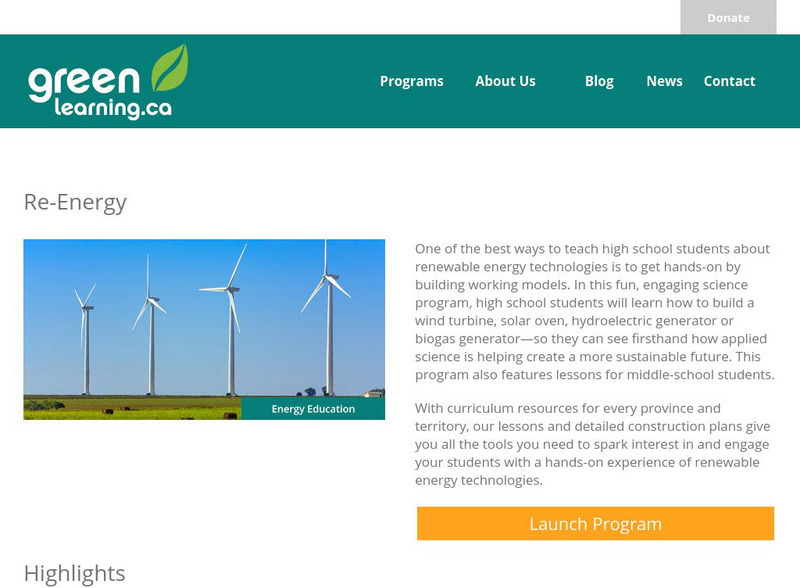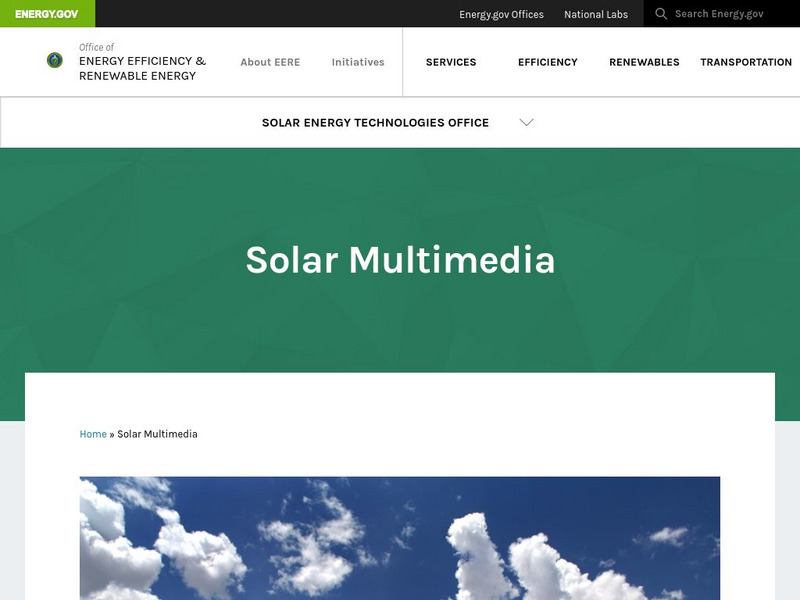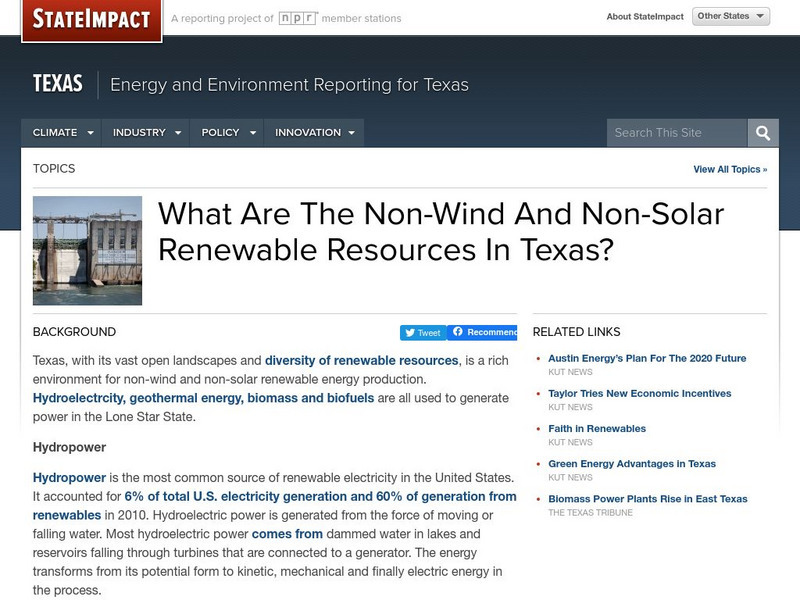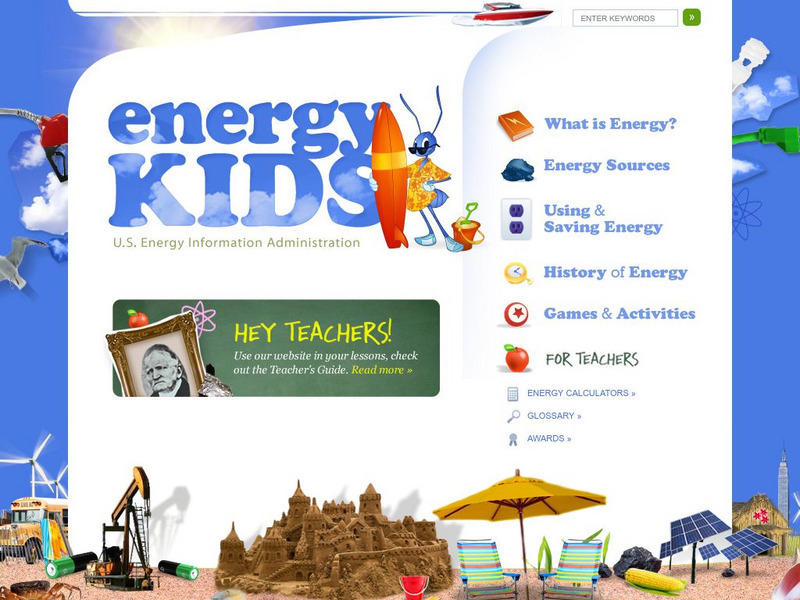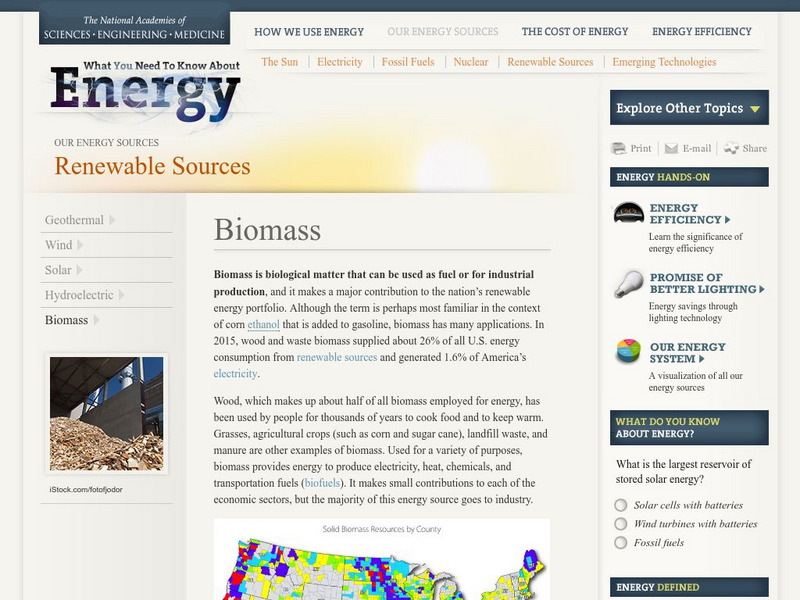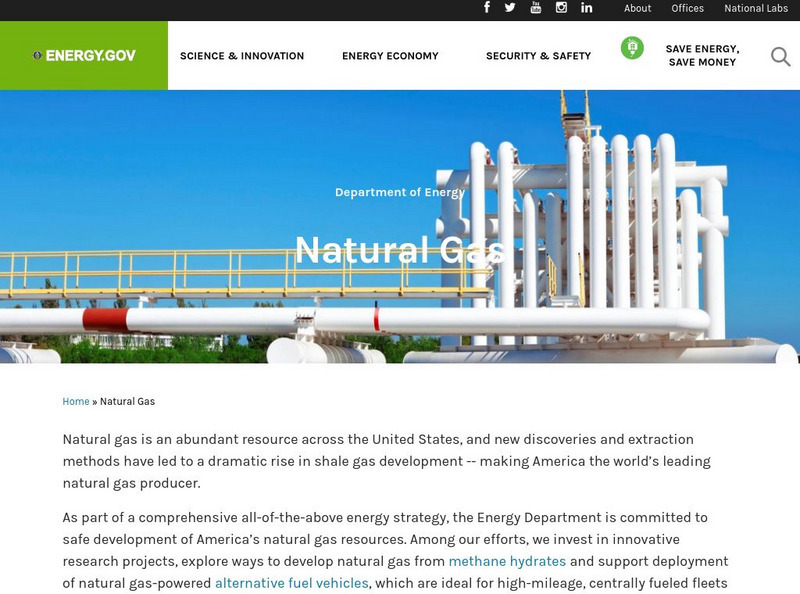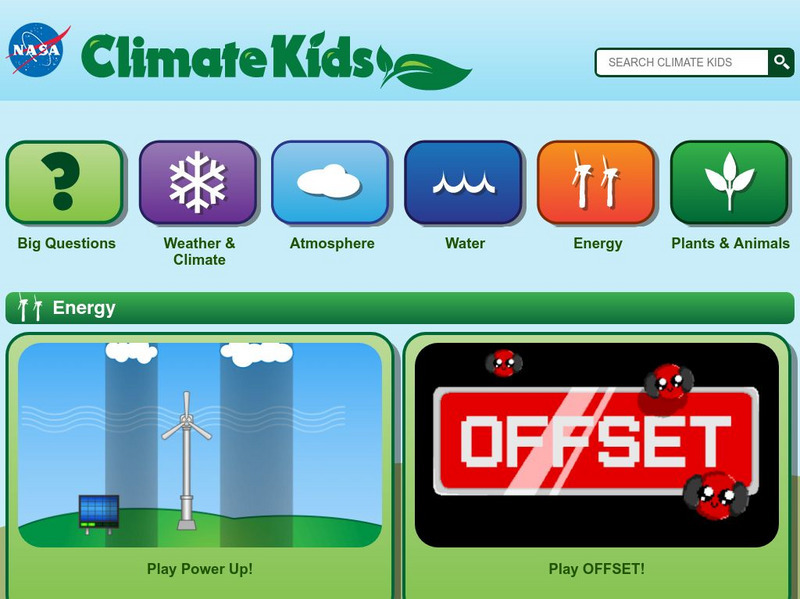PBS
Pbs Learning Media: Alternative Energy
Students are asked to explain what needs to be considered if alternative energy sources are to be used. [0:32]
ProCon.org
Pro Con: Alternative Energy: Can It Effectively Replace Fossil Fuels?
Website outlining the controversial issue of finding alternative energy sources to replace fossil fuels.
PBS
Pbs: News Hour: Alternative Fuels
This PBS science report on alternative fuels focuses mainly on ethanol. Multimedia features include a video from the NewsHour with Jim Lehrer [11:13], an interactive car comparison, and further reports on ethanol and other biofuels....
National Academies of Sciences, Engineering, and Medicine
The National Academies: What You Need to Know About Energy
This very comprehensive site aims to provide the latest, most accurate information available about energy, its consumption, sources of energy, alternative energy, impact on the environment, and conservation. One section focuses on the...
National Academies of Sciences, Engineering, and Medicine
The National Academies: Our Energy Sources
The many sources of energy production in the United States are described in this overview. Included are traditional sources, renewable sources, and new energy production technologies.
Other
International Institute for Sustainable Development: Energy
Learn what the International Institute for Sustainable Development is doing in Canada to help ensure that clean, alternative energy sources are used in the future.
Environduck
Enviroduck: Green Transportation Alternative Fuels for Cars and Vehicles
Learn how alternative fuels such as ethanol can help make cars and vehicles greener for the environment.
National Academies of Sciences, Engineering, and Medicine
The National Academies: Renewable Sources: Hydroelectric
Hydroelectric power has been a major source of energy production in the United States. More recently, other alternative energy sources have taken some of its market share. Hydroelectricity has both advantages and disadvantages, briefly...
National Academies of Sciences, Engineering, and Medicine
The National Academies: Renewable Sources: Wind
The status of wind energy production in the United States is described, with the advantages and disadvantages of this alternative energy source.
PBS
Pbs Learning Media: "Renewable Energy"
WLVT PBS 39 explores how a family in Berks County, Pennsylvania has put much of the renewable energy resources to work on their farm. All of these technologies were showcased at the Renewable Energy Sustainable Living Festival for the...
Other
Pembina Institute: Renewable Energy
Pembina Institute, a well respected Canadian research organization, has posted a variety of reports on renewable energy and energy efficiency here. Many of them respond to or make recommendations on federal and provincial government...
US Energy Information Administration
U.s. Eia Energy Kids: Energy Timelines
Research different types of fuel to see when major developments occured in their use. Fourteen different types of fuels can be researched, including fossil fuels and alternative fuels.
US Energy Information Administration
U.s. Eia Energy Kids: Energy Explained
A comprehensive source of information about energy in all its forms. Each type of energy is explained, along with information about its environmental impact, supported with graphs, charts, and other data. There is a twenty-question quiz...
National Academies of Sciences, Engineering, and Medicine
The National Academies: Our Energy Sources: Oil
The United States has a huge dependency on oil as an energy source. Efforts are being made to reduce this for many reasons, the main ones being the security of this source and the impact on the environment. Transportation is one area...
National Academies of Sciences, Engineering, and Medicine
The National Academies: Renewable Sources: Geothermal
Geothermal energy is being used today on a small scale but is an appealing alternative to other sources of energy as it has little impact on the environment. This source of energy and how we are harnessing it are described here.
National Academies of Sciences, Engineering, and Medicine
The National Academies: Renewable Sources: Solar
Solar energy is an appealing alternative to conventional sources of energy because it produces no greenhouse gases. An overview of its advantages and disadvantages is presented here.
Other
Pembina Institute: Renewable Energy Lesson Plans
There are a variety of lesson plans here on solar and wind energy, and on sustainable transportation.
Other
National Renewable Energy Laboratory: Learning About Renewable Energy
Extensive information about the different forms of renewable energy, energy efficiencies that can be achieved, energy research, and the many applications for renewable energy production.
US Department of Energy
U.s. Department of Energy: Solar Energy Technologies Program: Solar Multimedia
Browse and download from this multimedia collection which contains photographs, videos, B-roll, graphics, and animations related to solar technologies, research, and projects.
NPR: National Public Radio
Npr: What Are the Non Wind and Non Solar Renewable Resources in Texas?
An overview of renewable energy resources in Texas, aside from wind and solar energy. Covers hydropower, geothermal energy, and biomass.
US Energy Information Administration
U.s. Eia Energy Kids
This extensive resource provides information on renewable energy, nonrenewable energy and energy conservation.
National Academies of Sciences, Engineering, and Medicine
The National Academies: Renewable Sources: Biomass
The pros and cons of harnessing energy from biomass are outlined. Biomass refers to biological materials that are used to produce energy. Wood and manure are examples of biomass.
US Department of Energy
Department of Energy: Natural Gas
Natural gas is an abundant resource across the United States, and new discoveries and extraction methods have led to a dramatic rise in shale gas development -- making America the world's leading natural gas producer. We invest in...
NASA
Nasa: Climate Kids: Energy
Explore energy resources through stories, case studies, activities, and examples.




